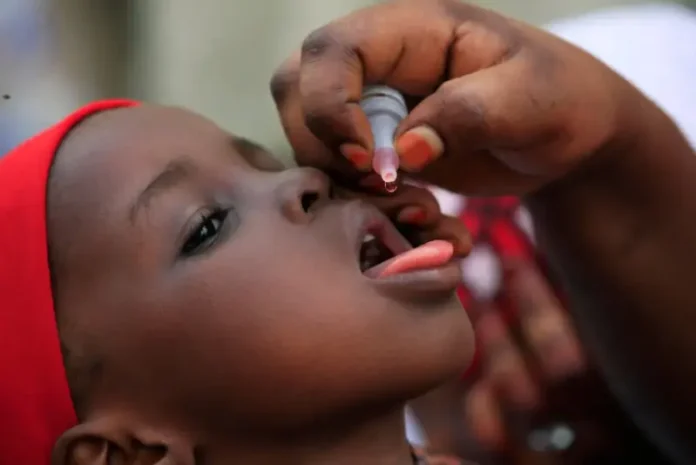By Andrew Stein
Special to The Times Kuwait
Eradicating polio has taken far longer than anyone expected. But the last 35 years of efforts to immunize every child against polio represent a major win for global health: a 99 percent reduction in cases means that nearly 20 million people are walking today who otherwise would have been paralyzed.
Now we must finish the job and achieve a polio-free world. That is why, in addition to combating wild polio in Afghanistan and Pakistan, the Global Polio Eradication Initiative (GPEI) is focusing on the places where children are most likely to encounter and spread variant poliovirus, particularly the more prominent type 2. This includes northwestern Nigeria, southeastern Democratic Republic of the Congo (DRC), northern Yemen, and southern Somalia, which have accounted for more than 84 percent of these cases globally since January 2022.
Insecurity, weak infrastructure, and challenging terrain make it difficult to provide children in these areas with the most basic health services, let alone vaccines. This type of ‘under-immunized’ environment is especially conducive to outbreaks of variant polio, which can occur when the live, weakened virus contained in the oral polio vaccine is allowed to circulate around unvaccinated or under-vaccinated communities. Tragically, the virus can regain its strength over time and paralyze children.
Stopping the spread of variant poliovirus in Nigeria, Somalia, Yemen, and the DRC is critical to building a world without polio, but success will not come easy. Fortunately, each of these countries has eliminated wild polio in the past, and a similar approach can be implemented to end variant outbreaks for good.
Nigeria, in particular, has demonstrated how improving population immunity through high-quality vaccination campaigns can contain outbreaks. In 2020, the country — together with the rest of the WHO African Region (with the exception of Somalia and Egypt) — was certified as being free of wild polio, marking the end of a decades-long effort to deliver a healthier future for its children. But variant poliovirus was slowly circulating in the background, before surging in 2021 and ultimately paralyzing more than 400 children in Nigeria over the course of 12 months.
The Nigerian government, steadfastly committed to eradicating polio, met the rapid rise in variant polio with a forceful response, which has led to a nearly 95 percent reduction in cases from the 2021 peak. Not only is the polio map shrinking, with fewer cases confined to smaller areas, but so, too, is the virus’s genetic diversity, which means that existing outbreaks are being interrupted while new ones are being prevented. Perhaps most importantly, immunity against variant poliovirus is rising.
Much of Nigeria’s success in bringing this explosive outbreak under control can be attributed to the pioneering rollout of the novel oral polio vaccine type 2 (nOPV2), which was engineered to be more genetically stable than its predecessor and thus less likely to revert to a form that can paralyze. This innovative tool, coupled with scaled-up vaccination efforts in under-immunized communities, has resulted in fewer new type 2 variant poliovirus outbreaks. Moreover, after administering more than 450 million doses of nOPV2 to children across the country since March 2021, Nigeria is now facing only two genetic strains of the virus, compared to seven when the rollout began.
Strong political commitment has also been instrumental in this vaccine rollout, with the creation of the Presidential Task Force on Polio Eradication keeping the fight against polio high on policymakers’ agenda. Moreover, programs like the Community Reorientation Women Network (CRoWN), supported by the Aliko Dangote Foundation, have contributed to Nigeria’s success by empowering women — who comprise the majority of community-health workers in remote areas — to identify zero-dose children and encourage vaccine uptake within their communities. These initiatives help parents and caregivers access essential health services for their children.
Nigeria is not the only country making progress. In Somalia, which faces the longest ongoing outbreak of variant poliovirus, GPEI is collaborating with other organizations to implement mobile health camps that can provide more than a half-million children with polio vaccines, as well as neonatal, nutrition, and curative services. In the DRC, the expanded use of digital mapping tools has helped health workers reach thousands of zero-dose children, and the government is setting a global example by convening Presidential Forums on Immunization and Polio Eradication; the most recent of which was held in June.
Emergency operations centers are now in place in each of these countries, helping to improve the speed and quality of their responses to polio outbreaks; in many cases, these centers also help defend against other health threats, including COVID-19 and measles. These innovations, together with the increased use of nOPV2, have already boosted immunity, reduced the number of cases, and shrunk the virus’s genetic diversity in the highest-priority areas.
The goal of ending polio once and for all is within reach, but getting there requires a collective effort. To achieve a polio-free world, financial support from global donors — a significant factor in making progress in Nigeria and elsewhere — must be increased. The governments of affected countries must also commit themselves, more strongly than ever, to eradicating the disease within their borders.
Nigeria beat polio once, and it can, and will, do so again. Let us ensure that every country experiencing outbreaks can put an end to the disease for good.

Andrew Stein
Deputy Director for Polio Outbreaks at the Bill & Melinda Gates Foundation.
Copyright: Project Syndicate
www.project-syndicate.org























